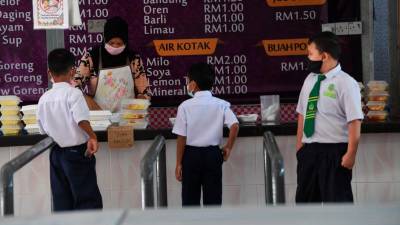PETALING JAYA: With the Education and Health ministries imposing a ban on 12 categories of unhealthy food in school canteens, operators face new rules, but outside vendors and school cooperatives are threatening to undo the initiative before it even takes root.
The ban, targeting items such as fried sausages, instant noodles, sugary drinks and French fries, aims to improve the diet of schoolchildren and prevent lifestyle related diseases.
While school canteen operators are complying, loopholes within schools and vendors outside the gates risk undermining the policy.
Malaysian Association of School Canteen Operators secretary Jazmi Hassan said food vendors have adapted quickly to circumvent the new rules.
“Every meal is complete and balanced – appropriate portion sizes with rice, vegetables and fruit. Fried rice, for instance, is never plain, vegetables must be included. Sugary foods are not allowed, donuts with sugar coating are banned. This is the principle of healthy food in schools, especially for primary pupils,” he told theSun via WhatsApp.
Despite their compliance, Jazmi expressed frustration that school cooperatives and external vendors continue to sell the very items now prohibited in canteens.
“In some schools, cooperatives, curricular clubs or societies sell such food to raise funds. Outside the gates, vendors often offer even more unhealthy options. Children avoid these foods inside the school. But once outside, they purchase them while waiting for their rides or parents.”
He called on the government and local authorities to coordinate enforcement to ensure that all sellers – not just canteen operators – be held accountable.
Nutrition experts warn that without a supportive environment, the ban may have limited impact.
University Teknologi Mara Assoc Prof Dr Azizah Abdul Rahman said: “If unhealthy items are available in cooperatives or outside schools, the intended effect is lost. Children need consistent cues guiding them to healthier choices, not mixed messages.”
Azizah added that education is crucial.
“Children must also learn why these foods are limited. It cannot be just a rule without explanation.
“When they understand the reasons, they are more likely to adopt healthy habits that last beyond school hours,” she said.
While considering international examples, Taylor’s University nutrition specialist Prof Dr Tilakavati Karupaiah cautioned that stricter systems like the United Kingdom’s centralised school kitchens may not work seamlessly in Malaysia.
“Centralised kitchens can improve standards, but they also carry risks, particularly microbial contamination,” she said.
She cited Indonesia’s Free Nutritious Meals Programme, launched in January 2025, which has already seen multiple food poisoning outbreaks across provinces, including West Java and Central Java, affecting thousands of students.
She emphasised that reforms must combine tighter standards with safeguards.
“Canteen operators cannot bear the burden alone. Parents, local governments and the wider food system must align.
“Otherwise, the good work inside canteens would be overshadowed by what remains available outside.”
